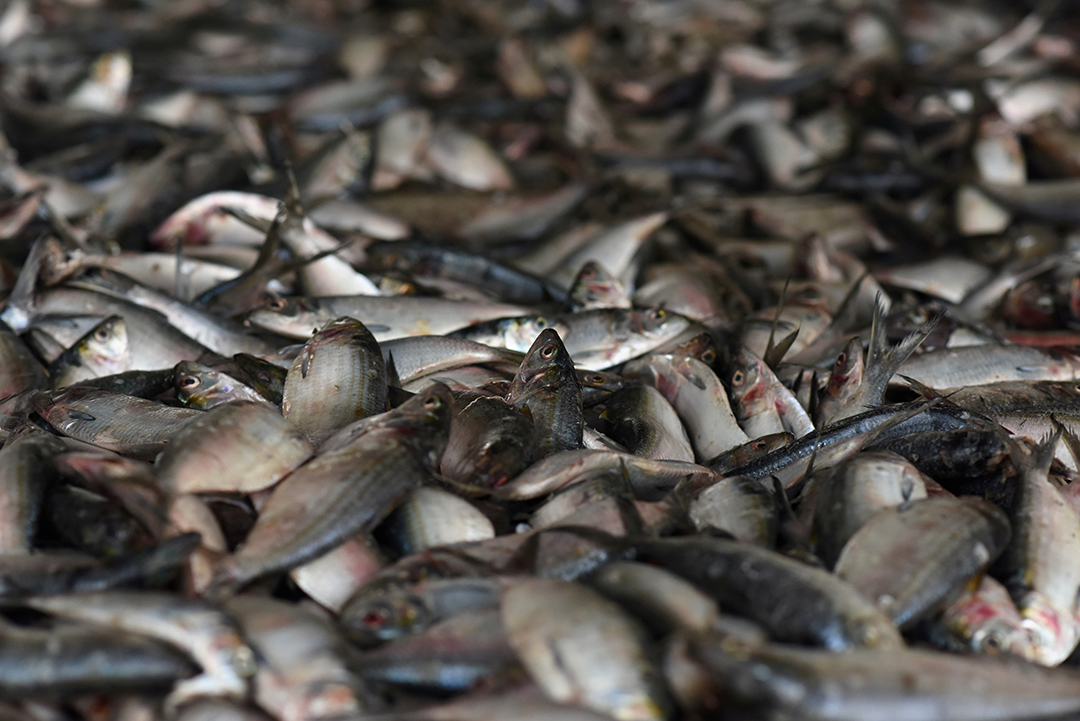Report: West Africa Considered a Future Fisheries Conflict Hotspot
ADF STAFF
Eleven West African countries are designated as future fisheries conflict hot spots. These places could see clashes over marine resources in the next six years due to fish stocks depleted by illegal, unreported and unregulated (IUU) fishing.
According to a World Wildlife Fund (WWF) report, Cameroon, the Democratic Republic of the Congo, Equatorial Guinea, Gabon, The Gambia, Guinea, Guinea-Bissau, Nigeria, the Republic of the Congo, Senegal, and São Tomé and Príncipe are highly likely to experience future conflict between foreign industrial trawlers, artisanal fishermen and local fishing communities.
Other such designated areas on the continent are Mozambique and Somalia.
China, which commands the world’s largest distant-water fishing fleet, is by far the worst IUU fishing actor in Africa and across the globe. Of the top 10 companies engaged in illegal fishing globally, eight are from China, according to the Financial Transparency Coalition (FTC).
“We’re looking at [Chinese trawlers] fishing in other people’s zones and bottom trawling,” an illegal practice that scoops up indiscriminate amounts of marine life from the ocean floor, said Vanda Felbab-Brown, co-director of the Brookings Institution’s Africa Security Initiative.
“They decimate a specific space of oceans by taking fish from artisanal fishers in West Africa,” Felbab-Brown said during an event co-hosted by Brookings and the WWF. “Some fishermen can no longer fish to feed their families.”
Competition for fish sometimes results in direct conflict between small artisanal fishing boats and large industrial trawlers. These larger boats are known to ram smaller vessels, damage their nets and equipment, and spray them with water cannons.
Illegal fishing has led to the loss of more than 300,000 artisanal fishing jobs in the region, according to the International Collective in Support of Fishworkers.
The scourge costs West Africa an estimated $10 billion per year, according to a September 2023 report by the Stimson Center, a think tank, while the FTC found that the region attracts 40% of the world’s illegal trawlers.
Throughout the region, Chinese trawlers have signed long agreements to fish, but they are largely held unaccountable for illegal activity as there is limited maritime law enforcement capability in many areas, Felbab-Brown said.
Corruption and the nonpublic nature of these agreements leaves “minimal ability for local communities to understand” foreign fishing deals, she added.
Sarah Glaser, the WWF’s senior director of ocean futures, said during the webinar that some Chinese fishing deals in West Africa are good for up to 90 years.
Felbab-Brown and Glaser linked IUU fishing to piracy and other sea crimes.
Although the number of piracy incidents in West Africa remained low in 2023, the Gulf of Guinea still accounted for three of the four globally reported hijackings and all 14 crew kidnappings last year, according to the International Chamber of Commerce’s International Maritime Bureau’s Piracy Reporting Center.
Illegal fishing likely will be exacerbated by changing water temperatures, which may force fish to migrate irregularly, Glaser said.
“You’re going to have conflict over fish as a declining resource,” Glaser said. That competition may force “fishermen to move from Country A to Country B” in search of food, she added.
Felbab-Brown warned that the lack of fish may persuade traditional fishermen to seek illicit employment, such as drug smuggling.
“Oceans are intrinsically linked to what happens on land,” she said. “Importantly, oceans are an enormous source of food security, a crucial source of protein. The loss of food security can result in a whole variety of conflicts.”
Felbab-Brown argued that a “whole-government approach” to combat illegal fishing “should address organized crime groups.”
Several experts agree that the region needs greater collaboration and cooperation, and improved legislation, operations and training, to combat illegal fishing.


Comments are closed.